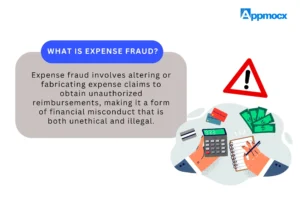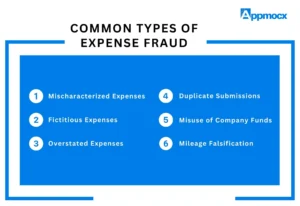What Is Expense Fraud?

Manipulating expenses, through fraudulence schemes such as falsifying or altering expense claims to obtain reimbursements or evade personal expenses is considered unethical. Falls under the category of financial fraud, in numerous companies.
In 2024 economic struggles have made fraud more concerning than before as increasing inflation and high interest rates are putting pressure on households’ finances causing stress for workers.
According to the data, from the Federal Reserve Bank of New York’s report in the quarter of 2023 revealed that American credit card debt exceeded $ 1.13 trillion with an increment of over $ 50 billion. A concerning trend that may push individuals towards resorting to expense fraud, for financial ease.
Typical Forms of Expense Fraud

- Mischaracterized Expenses: Business-related costs such as meals and travel expenses can be accounted for as part of expenses.
- Fictitious Expenses: Employees might try to use receipts or invoices to support their expense reports.
- Overstated Expenses: Some Employees members might exaggerate the expenses for items such as hotel stays or meals while filing their reports.
- Duplicate Submissions: Submitting a single receipt multiple times for reimbursement.
- Misuse of Company Funds: Utilizing a company credit card for personal expenditures.
- Mileage Falsification: Employees might stretch the truth, about how they have traveled or the modes of transportation they have used.
It’s crucial to emphasize that engaging in misconduct is considered unlawful behavior at the workplace. Employees are urged to follow the company’s expense policies and guidelines to avoid any outcomes.
What Drives Employees to Commit Expense Fraud?
Workers may commit expense fraud for a variety of reasons, like seeking rewards or personal perks or due to a lack of understanding about the company’s rules and protocols.
- Financial gain: Some individuals, at work participate in fraudulent behaviors to improve their financial situations. The growing financial crisis in 2024 is emphasized by a $ 13 trillion debt from credit cards in the United States. Exacerbates this issue. People experiencing difficulties are more likely to turn to methods as a means of alleviating their money problems.
- Lack of understanding: Some employees may be unsure about the company’s rules and guidelines for filing expense claims which could result in mistakes or inaccurate expense reports being submitted unknowingly.
- Pressure and Stress: Some workers might feel compelled to meet goals or benchmarks. Could resort to altering their financial records to give the appearance of meeting those requirements.
- Apathy or Disengagement: Sometimes employees might start feeling disconnected from the company. End up committing expense fraud either as an act of rebellion or simply ignoring the rules, in place.
Please remember that although these reasons can offer some background information they should not be used as a justification for employee expenses, under any circumstances.
Effects of Expense Fraud on Businesses
Expense fraud presents reputational challenges for companies as per the findings, by the Association of Certified Fraud Examiners (ACFE) around 20 percent of expense fraud instances result in losses exceeding $1 million. Expense fraud detection is crucial to mitigate such risks.
Moreover committing expense fraud can have an effect on the morale of employees. Erode trust within the company. Additionally public exposure of wrongdoings may lead to a decline in stock prices.
In 2023, Oversight pointed out a pattern by noting a 50 percent increase in breaches linked to expense reimbursements and purchasing cards. A sign of a mounting problem, during challenging times.
6 Strategies for Businesses to Mitigate Expense Fraud
As a business, you can mitigate expense fraud within your organization by implementing the following practices:
1. Establish a Clear and Detailed Expense Policy.
Creating an expense policy is crucial to prevent fraud incidents. It’s vital to have a policy that clearly states which expenses are reimbursable and lays out the documentation and approval processes. This can help reduce the chances of behavior. Regularly revising and adapting the policy to match changing business requirements and compliance standards is key. It’s also essential to make sure that all employees can easily access the policy.
2. Routine Employee Training
Ensuring that employees receive regular training on the company’s expense policies is crucial to help them grasp what constitutes acceptable expense claims submissions effectively. This training should highlight the consequences of submitting claims and offer guidance to employees on completing their expense reports.
3. Perform Regular Expense Audits
Conduct expense audits are essential to stop employees from committing fraud through their expenses by finding inconsistencies and misconduct patterns in their spending habits. Here’s a simplified method, for carrying out an expense audit:
- Create an Audit Plan: Develop an audit plan that outlines the scope of the audit and its specific focus areas and sets a timeline for completion.
- Gather and Examine Expense Reports: Compile all expense reports, from a period. Review them to ensure they comply with the organization’s expense guidelines.
- Check Documentation: Make sure that every expense is backed up with paperwork such as receipts and invoices along with explanations to match the company’s rules.
- Conduct Data Analysis: Utilize data analysis techniques, like trend analysis and statistical sampling to pinpoint patterns or irregularities that may signal fraud.
- Report Findings and Recommendations: Prepare a report that outlines the results of the audit and provides recommendations for enhancement measures to be shared with stakeholders such as executives and the board of directors.
- Follow Up: Make sure to follow up by implementing the suggestions provided during the audit and resolving any issues that were pinpointed.
- Plan for Future Audits: After reviewing the results of the audit report set a timeline for the audit and get ready, in advance.
The auditing of expenses should align with the company’s culture and values as per company policy guidelines. It is crucial for the audit to be carried out confidentially and impartially to uphold the integrity of its conclusions.
4. Set Guidelines for Managing Employees
Establishing protocols for addressing instances of staff expense fraud is crucial, for preventing and addressing misconduct effectively in the workplace outlining measures to implement robust policies that deter fraudulent activities related to expenses:
- Define Expense Fraud Explicitly: Clearly define Expense Fraud by detailing the actions that fall under this category in the company’s expense guidelines. Give instances of behavior like altering receipts, overstating expenses or incorrectly categorizing costs to remove any uncertainty.
- Establish Uniform Disciplinary Measures: Create a method for addressing issues by providing various consequences depending on the gravity of the violation committed by individuals, within the organization’s framework of rules and regulations.
- Communication Guidelines: Make sure all staff members are adequately briefed about the expense guidelines through training sessions and easy accessibility to the policy document.
- Establishing a Reporting System: Create a system for employees to report any suspected instances of expense fraud by introducing a hotline or email option and making sure it is widely promoted among staff members.
- Establishing Inquiries: Develop a procedure for looking into cases of alleged expense fraud while prioritizing confidentiality and objectivity throughout the process.
- Establish Post-Investigation Procedures: Create a plan for handling investigation results that includes addressing measures and implementing preventive measures for future occurrences.
- Regularly Review and Update: Regularly revise the guidelines to ensure they remain relevant and efficient in meeting changing requirements over time.
Ensure that these guidelines always adhere to regulatory standards with the primary objective being the establishment of a culture centered on compliance and integrity within the company.
5. Establish Robust Internal Controls
Putting in place checks such as requiring multiple approvals for significant expenses can help decrease instances of fraudulent claims effectively.. Additionally establishing penalties for individuals caught engaging in activities acts as a powerful deterrent making other staff think twice before engaging in similar behavior.
6. Conduct Routine Audits of Credit Card and Mileage Logs
Businesses that provide company credit cards or reimbursements for travel expenses should conduct audits to spot any inconsistencies in spending records by referencing credit card statements with expense reports and ensuring that mileage logs are precise and reflect realistic travel distances.
How Appmocx Helps Prevent Expense Fraud
Our expense management tools act as resources to combat employee expense fraud by automating the reporting and reimbursement procedures effectively. This automation greatly reduces the chances of falsifying or altering expenses. Promotes compliance and accuracy in business practices. Moreover, it improves the efficiency of managing expenses in a company, here is how:
- Automated Expense Reporting: Appmocx allows employees to digitally file expenses. Promptly checks each submission to ensure compliance with company rules. This instant verification of adherence helps identify violations before the expenses are formally submitted for approval.
- Electronic Receipt Capture: Employees have the option to electronically capture and submit receipts to reduce the chances of any falsification or tampering incidents occurring. The receipts are stored securely in a cloud system, for access by finance teams, during audits and to avoid submitting duplicates.
- Data Analysis and Real-Time Monitoring: Appmocx’s spending overview dashboard provides a perspective on the company’s expenses across the board to assist in identifying any irregularities that could indicate activities or patterns of behavior that do not align with standard practices. Furthermore, additionally real time monitoring mechanisms generate notifications, to management regarding any activity or violations of company policies as they occur.
- Approval Workflows: Custom approval processes can be tailored based on the expense amount or category of expense to guarantee that authorized managers or supervisors assess and authorize spending requests. Any expenses that deviate from company guidelines are promptly. Forwarded to specified finance department staff for review and assessment.
- Integration with Other Systems: Appmocx smoothly integrates with systems such as accounting software and ERP systems to maintain precise data throughout the organization.
- Enhanced Security Features: Appmocx ensures high level security measures to safeguard information by using encryption methods along with multi factor authentication and access controls to minimize the risk of unauthorized entry, into expense reports and vital company data.
- In depth Audit Trails: Appmocx electronic audit trails document each stage of the expense reporting journey, starting from submission to approval. This empowers finance teams to monitor all engagements related to expenses and gain insight before authorizing any expenses.
ACFE Checklist: Evaluating the Effectiveness of Expense Fraud Prevention (Bonus)
In 2018 report on fraud prevention strategies evaluation tools for organizations the Association of Certified Fraud Examiners (ACFE) outlined a checklist to assist in assessing the efficacy of strategies implemented by companies in preventing fraud cases.
- Have all employees received fraud training sessions on a regular basis?
- Is there a reporting system established within your organization to address instances of fraud effectively?
- Do companies regularly communicate fraud detection strategies to help employees become more aware of how to detect activities ?
- Has the top management nurtured an environment of ethical behavior?
- Do we regularly carry out evaluations of fraud risks to pinpoint any weaknesses, in the company?
- Are auditors given the freedom and necessary resources to work independently of management?
- Does the HR team conduct background screenings that cover records as well as criminal and credit histories?
- Are there any programs for employees to get help, with addiction or mental health issues?
- Do you regularly carry out surveys to assess how satisfied and healthy your employees are feeling at work?
Implement this list in your companys fraud plan to stop expense fraud from infiltrating the organizational ethos, for good. Technology is crucial for detection purposes, however centric methods are equally important, in fostering openness and discouraging conduct.